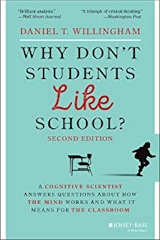
Is IQ fixed at birth, or is it changeable? Can intelligence be increased? Can it decline? The cognitive scientists’ answer to these questions have changed over the past decades and parents of children who have struggled with reading need to understand the implications of that change, for scientists have only recently determined that life experiences are indeed capable of increasing or decreasing one's intelligence over time.
The Remaining Challenge
If you are the parent of a struggling reader and you manage to help your child overcome a reading problem, whether you do so by utilizing information you find here or by other means, you might still face a challenge. Your child might have spent countless hours in resource rooms or LD classrooms in the early grades. If so, his overall education probably suffered. He might even have come to think of himself as less capable than his peers, even less intelligent. Sadly, though your child might have started his school years with above average intelligence, after several years of struggling with reading that might no longer be true.
A Book Recommendation
Regardless of where you are in the process of helping your child with any reading issues he might have, there is one book that you should read as soon as possible. In fact, all teachers and parents should read it. The title is Why Don’t Students Like School? and it’s written by Daniel T. Willingham, a cognitive scientist. When you get it, consider going straight to Chapter 8 titled “How Can I Help Slow Learners?”, an unfortunate choice of chapter title because it’s really about how anyone’s intelligence is malleable, that is, can be changed.
Dr. Willingham spends the first half of the chapter explaining why scientists who once thought that intelligence was largely determined by genetics now think that intelligence is largely shaped by one’s environment. He goes over the evidence supporting this dramatic switch and it’s both fascinating and convincing. But why is this important?
First, it’s important because you need to convince yourself that intelligence can be changed. Why? Both so that you will realize that your child’s intelligence really might have declined while sitting in a resource room for hours, missing out on the regular classroom curriculum, and also so that you will realize that it is possible to reverse the process and implement steps that will increase his intelligence and even move it beyond the level he might have attained had he never struggled to read in the first place. By the way, all this holds true even if the reading problem persists, though it becomes more difficult to implement.
Also, it’s important because after you have convinced yourself, you then have to convince your child that he can increase his intelligence, whether that means catching up to his peers, or passing them. Dr. Willingham illustrates how subtle cues that we might not even mean to send can hold your child back and it’s important to understand how and why this happens.
Dr. Willingham is clear on what needs to be done to catch up. It’s a long process and it will involve a lot of work, but you have the rest of your child’s school career to work with and even beyond that if you can convince him of the value of putting in a sustained effort to improve even after high school. Assuming you manage to convince yourself that your child’s intelligence can be increased, you will find the rest of Why Don’t Students Like School? to be extremely relevant, but I want to share one quote, from page 35:
“If you want to be exposed to new vocabulary and new ideas, the places to go are books, magazines, and newpapers. Television, video games, and the sorts of Internet content that students lean toward (for example, social networking sites, music sites, and the like) are for the most part unhelpful. Researchers have painstakingly analyzed the contents of the many ways that students can spend their leisure time. Books, newpapers, and magazines are singularly helpful in introducing new ideas and new vocabulary to students."
So there is your answer in a nutshell. Assuming you are successful in helping your child overcome his reading problems, the way to catch up is to read, read, read! It’s important to read the right materials as well. But what if you don’t succeed and your child continues to resist reading? Then the obvious choice is to read to him, to utilize books on tape, and to employ computer programs that convert the printed page to sound.
Dr. Willingham’s Blind Spot
Although Dr. Willingham has given us an amazing book, he tucked in a footnote that I want to draw your attention to here before you encounter it in the book. On page 142 in the chapter on helping slow learners he says the following:
“What can we do for slow learners? The point of this chapter is to emphasize that slow learners are not dumb. (footnoted here) They probably differ little from other students in terms of their potential. Intelligence can be changed.”
And here’s the footnote, from page 145:
“This is not to say that students don’t have learning disabilities. Some do. My conclusions in this chapter do not apply to these students.”
Do you see why I’m alerting you to this? I would guess that the majority of children with reading problems have been considered at least borderline LD at one point or another in their school careers.
Yet the overriding message on this website is that if a child has already had good phonics instruction, then vision issues are often responsible for reading problems that remain. First fix the vision, address any phonics deficiency if it exists, then read! Many of the children he dismisses with his innocuous footnote are the very ones whose intelligence levels should benefit most from additional reading, assuming their vision needs are first met and they understand phonics.
I’m not saying that he doesn’t have a point, as there is a broad range of learning disabilities, some having nothing to do with vision skills deficits. But vision therapy, coupled with an effective phonics program, would, in my experience, significantly reduce the number of students considered learning disabled. My advice: Ignore that footnote and devour the book.




